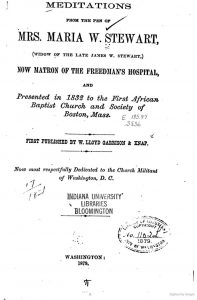This is a guest post by Lavonda Kay Broadnax, digital reference specialist in the Library’s Researcher and Reference Services Division.
Maria Stewart’s “Meditations,” 1879.
A few weeks ago, we celebrated Dr. Martin Luther King Jr. and his work as an activist. Some 100 years before King’s powerful entry into the civil rights movement, however, the fight for civil rights was already well underway, and at its center was Maria W. Stewart (1803–1879).
Stewart is one of the earliest women orators whose speech texts are available to us today. This is quite remarkable, given the economic and cultural realities of her time, including the widespread existence of state antiliteracy laws. The Library is fortunate to hold the 1879 edition of “Meditations from the Pen of Mrs. Maria W. Stewart.” It is an enlarged and updated reprint of “Productions of Mrs. Maria Stewart, Presented to the First African Baptist Church and Society, in the City of Boston,” which was initially published in 1835.
Stewart was born free in Hartford, Connecticut. An orphan at 5, with no means of support, she was “bound out” or served as an indentured servant to a minister. It is believed that during these years she received some religious training and was able to avail herself of the minister’s library. At 15, her service to the minister ended, and she supported herself as a servant, pursuing her education through Sabbath schools.
At 23, she married James W. Stewart, who had served as a seaman during the War of 1812. After the war, he established a successful and independent shipping business that generated a substantial income. The couple settled in Boston, where Maria involved herself with a number of African-American organizations and institutions. Among these was the Massachusetts General Colored Association, through which she became acquainted with David Walker, an outspoken member and author of the provocative document, “Walker’s Appeal.” He became an important and influential force in Stewart’s life. Although they differed on tactics, they were both focused on ending the oppression of African-Americans.
Three years after her marriage, Maria’s husband died. Six months later, Walker was found dead in his doorway. The death of both men was very difficult for Stewart. Making matters worse, the sizeable estate her husband left her was taken away through the legal maneuvers of the white executors of his will. This series of tragedies inspired Stewart to turn to her faith, a change made manifest through a special commitment to God, African-Americans and political activism. She was transformed into a “holy warrior” and was willing and ready to fight.
It was “taboo” in Stewart’s time for a woman to speak to an audience comprised of both men and women, but she felt absolutely compelled to speak, to express herself and to inspire others to take action. One of her speeches was given in Boston at Franklin Hall, the meeting location of the New England Anti-Slavery Society. In spite of the danger, she challenged the audience of men and women, African-Americans and whites, to join the fight for equality and justice.
Although King and Stewart lived in vastly different times, and their work was accordingly very different, it is possible to identify characteristics they had in common in the struggle to improve the civil rights of African-Americans: strong spiritual convictions; courage to face hostility; use of the Bible to inspire audiences; and intense love for African-American people.
A final example is a shared message of the ultimate self-sacrifice, expressed by Stewart in a 19th-century manner:
Many will suffer for pleading the cause of oppressed Africa, and I shall glory in being one of her martyrs; for I am firmly persuaded, that the God in whom I trust is able to protect me from the rage and malice of mine enemies, and from them that will rise up against me; and if there is no other way for me to escape, he is able to take me to himself.
King and Stewart were exemplary activists in the struggle for equality and justice in America. This month, let us also be grateful for those in the past, present and future whose names we know and whose names we don’t know, but whose work, sacrifices and struggles pushed and will continue to push the civil rights movement forward for the benefit of all Americans.
Interested in learning more? The Library of Congress exhibit The Civil Rights Act of 1964: A Long Struggle for Freedom captures, in a succinct manner, the history of the struggle for civil rights in America. The Library’s website also makes available online the full text of speeches and essays written by Maria Stewart and other early African-American women activists. And if you have questions about the civil rights movement, Stewart or King, please don’t hesitate to Ask-Us.















